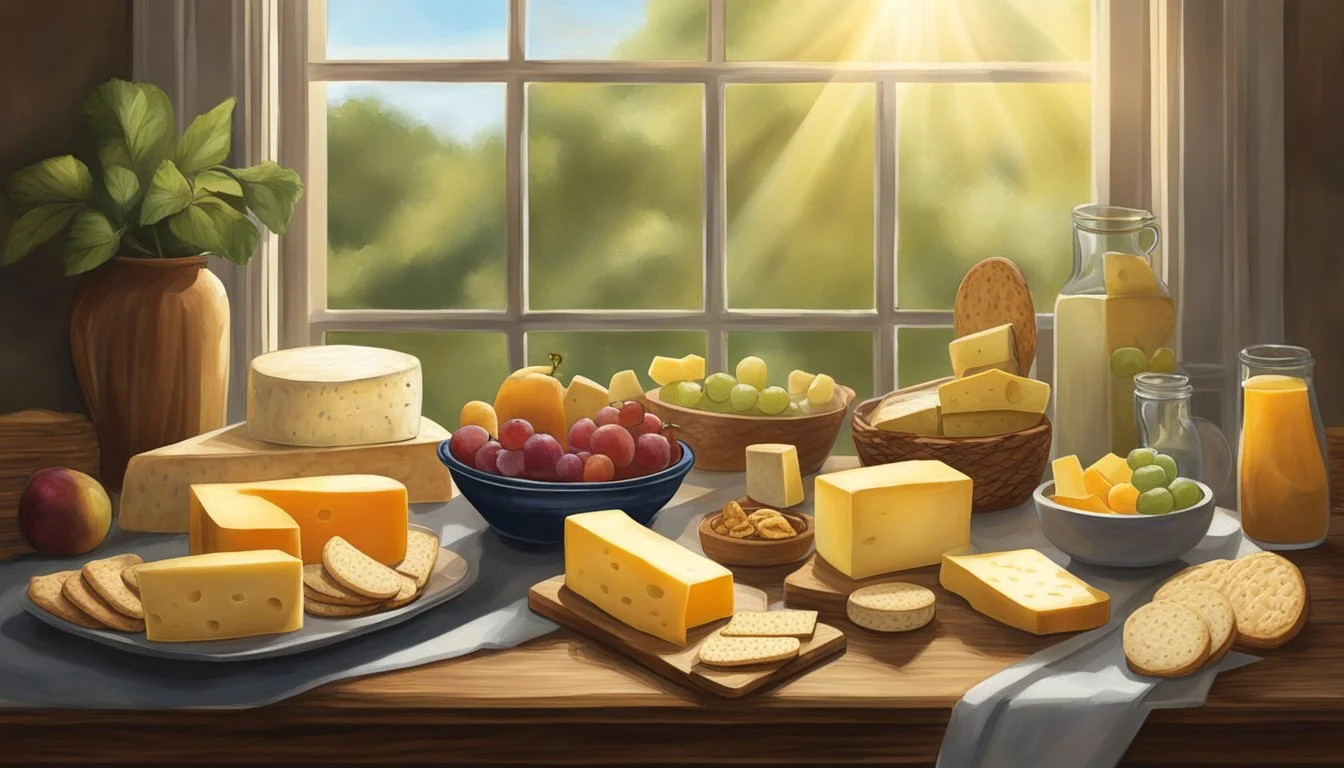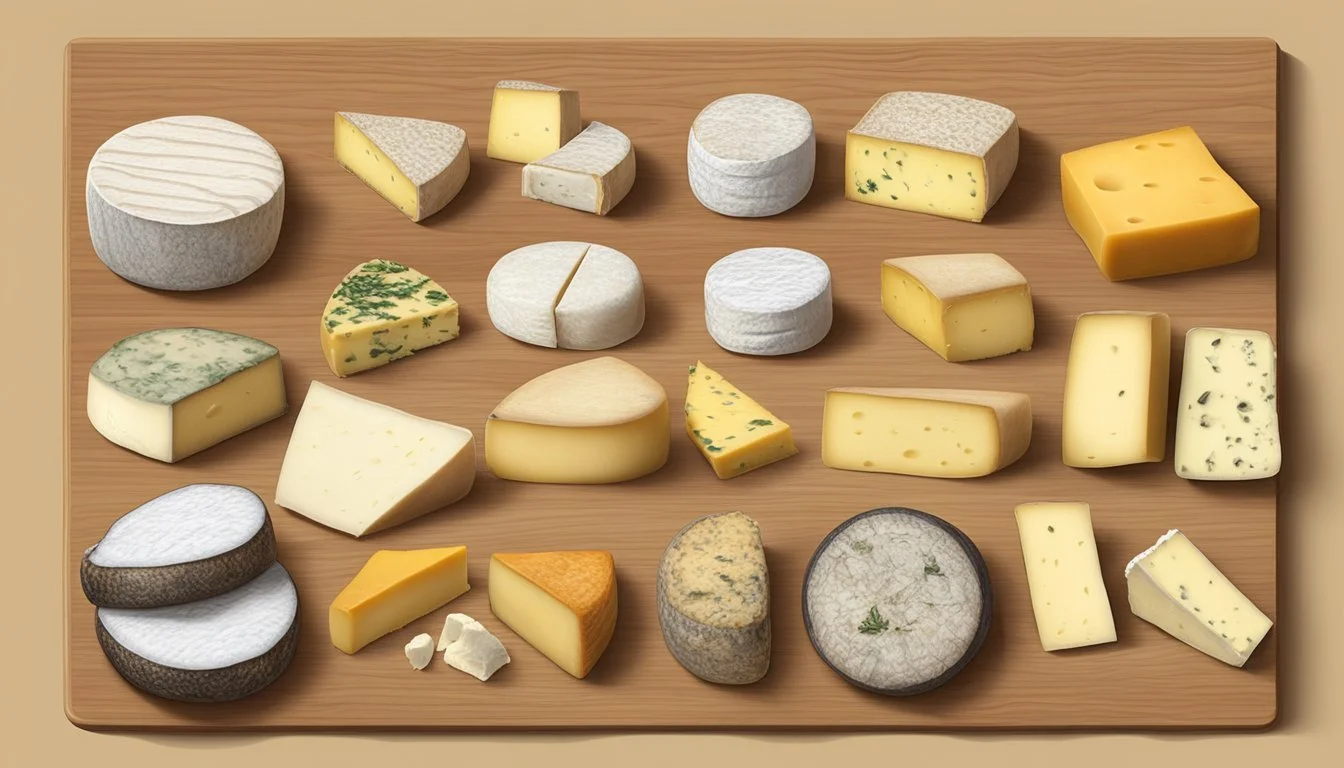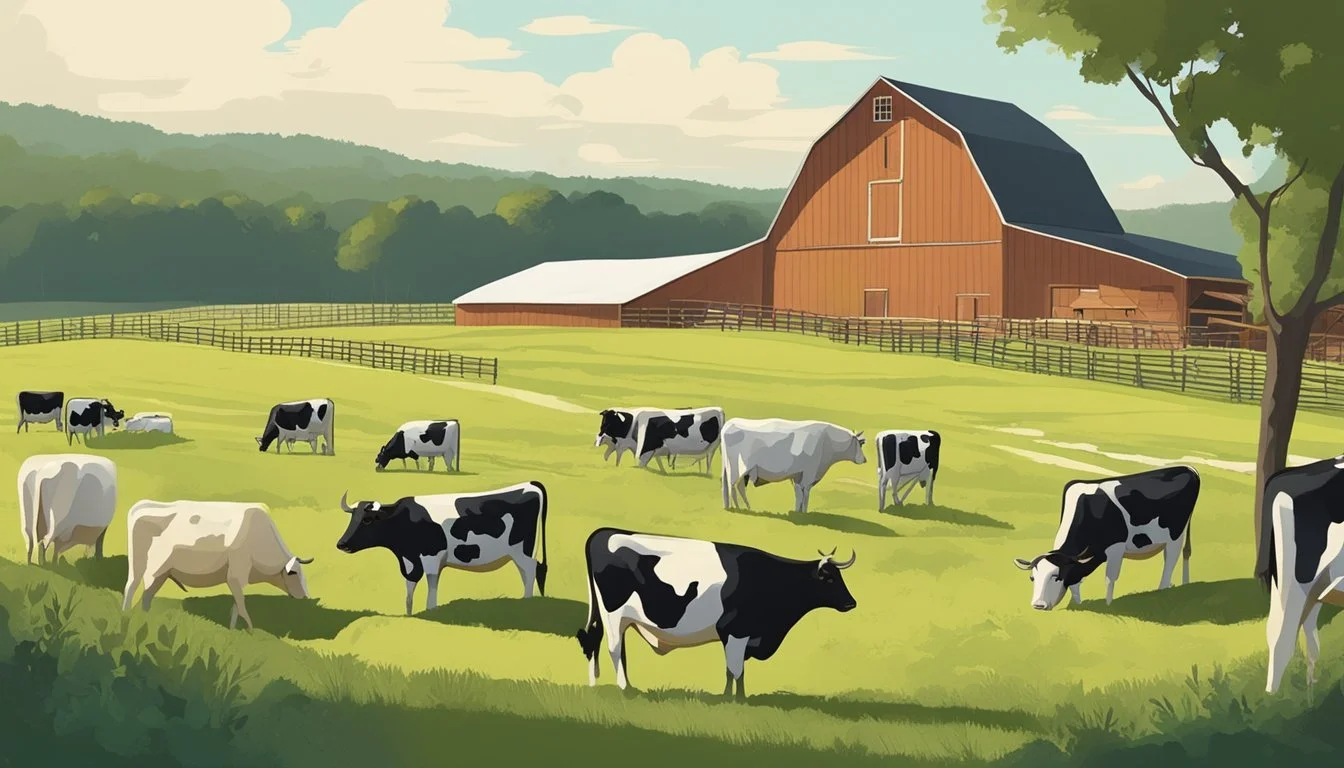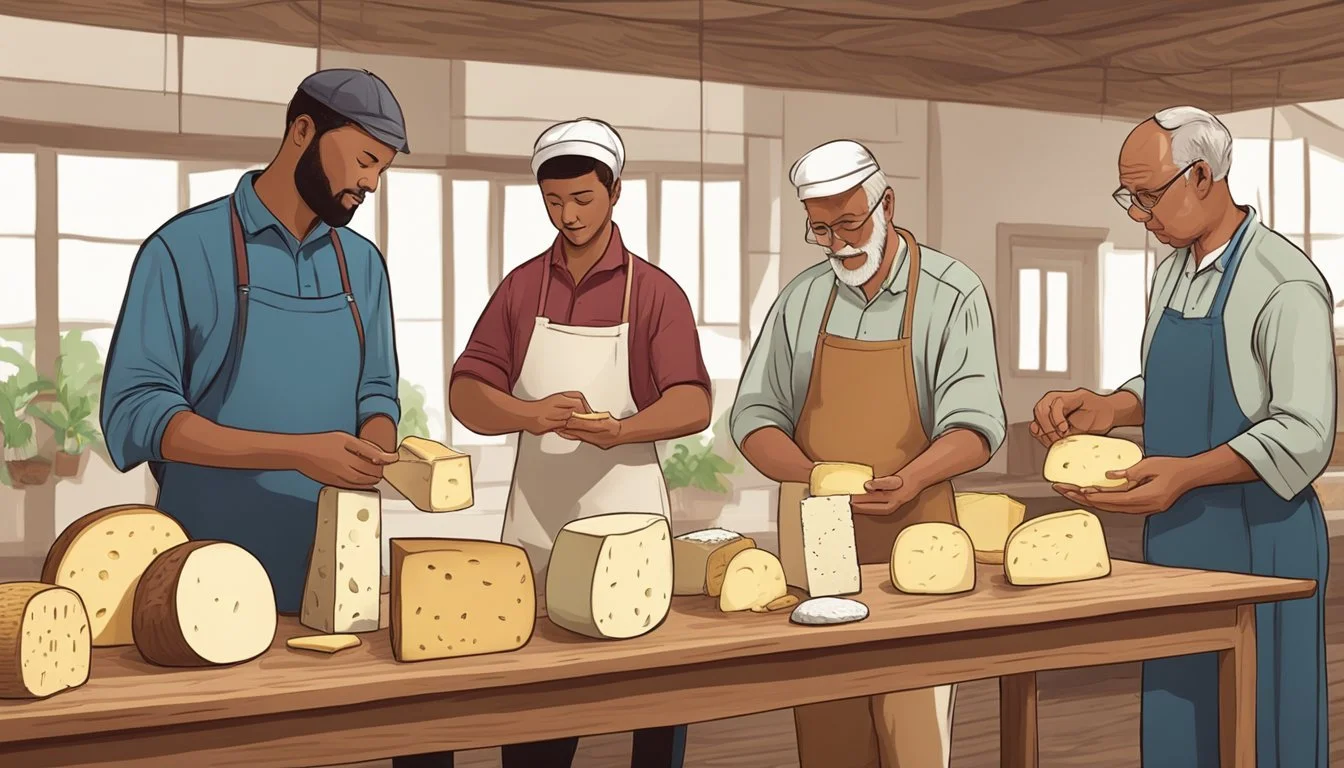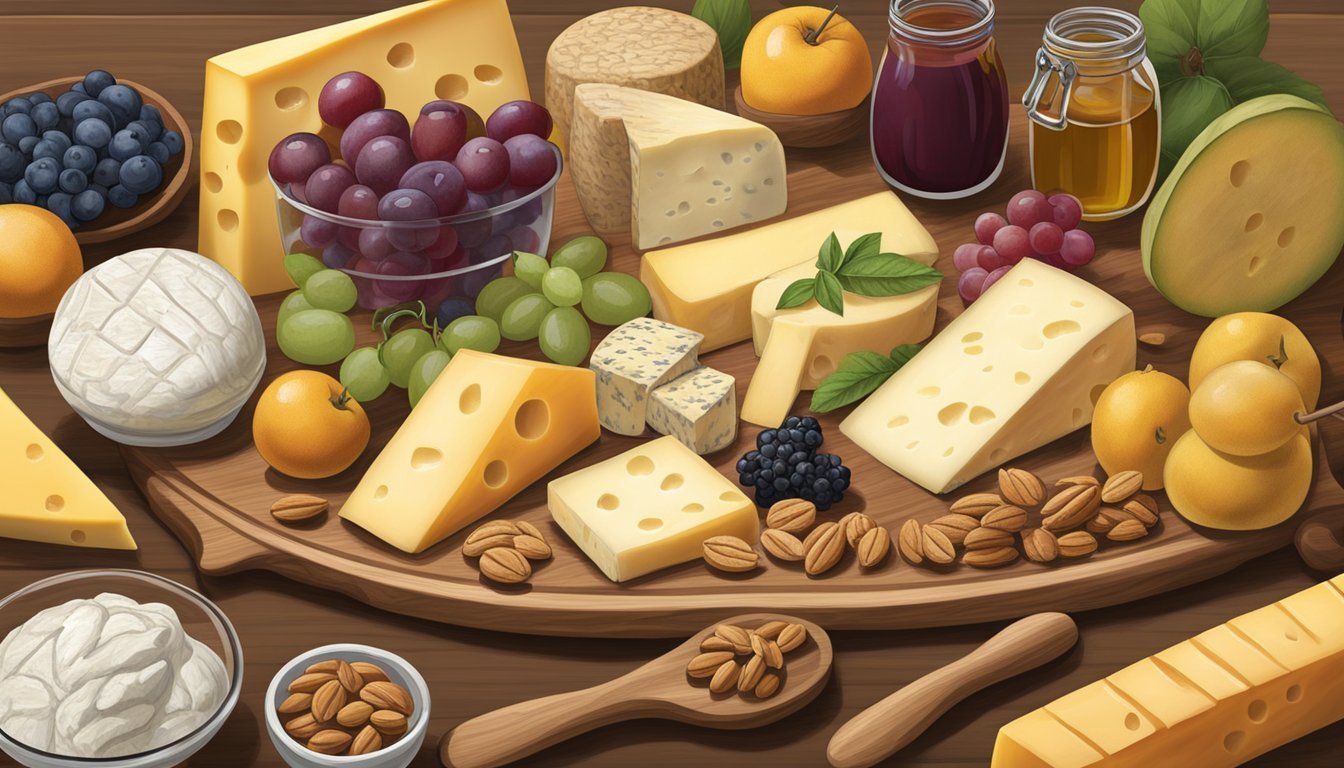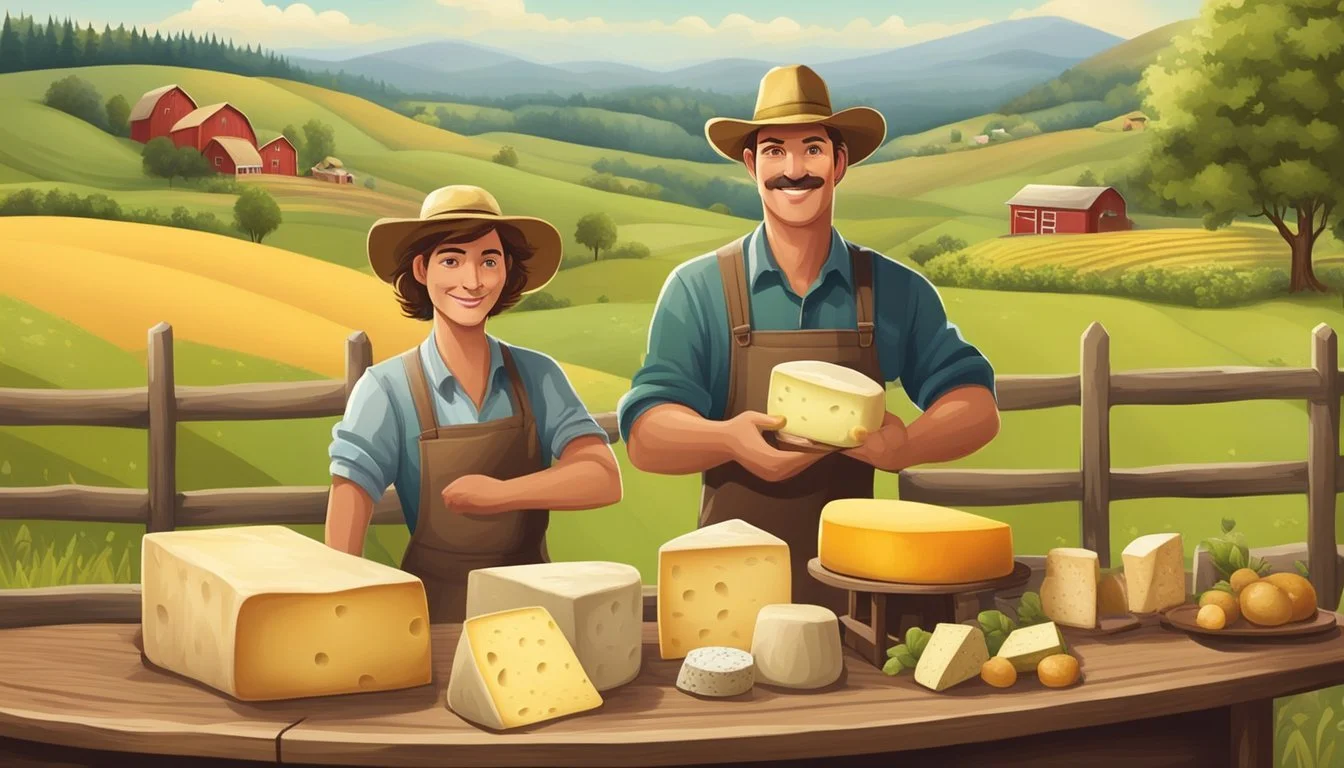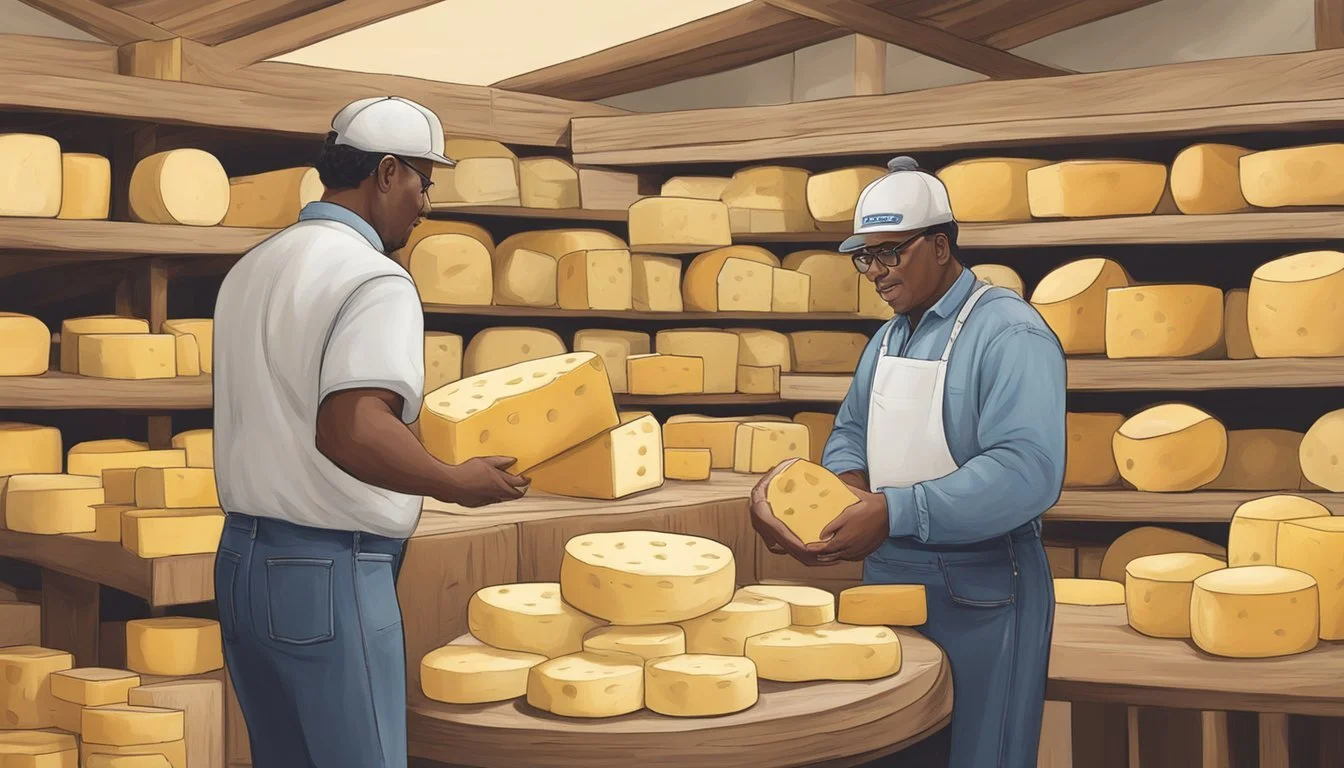South Carolina Artisan Cheese
A Guide to the State's Finest Cheesemakers
South Carolina has emerged as a burgeoning hub for artisan cheese (how long does cheese last?) production, with a variety of local creameries and farms developing a reputation for crafting high-quality cheeses (What wine goes well with cheese?). The state's agricultural tradition and access to fresh, locally sourced raw milk have given rise to an array of cheeses that include flavors such as artisan Gouda, Colby, and other handcrafted varieties. These products are the result of meticulous processes involving culturing, molding, salting, and aging, all performed on-site by skilled cheese artisans.
Traversing the South Carolina Cheese Trail offers a glimpse into the state's cheese-making culture, connecting cheese enthusiasts with the rural areas where these culinary treasures originate. Cheese-making businesses such as Forx Farm in Anderson have found their niche in the local market, serving the community with cheeses that celebrate South Carolina's local flavors and dairy farming heritage.
Artisan cheese houses and specialty shops scattered across the state, from Charleston to Columbia, provide a testament to the growing popularity of local cheeses. These establishments often feature an assortment of both regional and international cheeses, paired with a curated selection of wines that enhance the cheese-tasting experience. For those passionate about the craft of cheese making or simply in search of a palate-pleasing adventure, South Carolina's artisan cheese scene offers a rich and satisfying journey.
History of South Carolina Artisan Cheese
The trajectory of South Carolina in the artisan cheese industry begins with a blend of rich dairy farming heritage and a modern zest for craftsmanship. The state's foray into artisanal cheeses is not just a story of food but also a narrative of local entrepreneurship and sustainable agricultural practices.
In Seneca, for instance, the Whispering Pines farm exemplifies the state’s dedication to creating high-quality, local cheese from the milk of their own goats and sheep. Products like Golden Manchego, Oconee Jack, and Halloumi trace their storied past back to traditional cheesemaking methods while incorporating a distinctive South Carolinian twist.
Artisanal cheeses in the state often illustrate a convergence of various cultural influences, manifesting in an array of flavors that honor the time-tested techniques of curds and whey. Here, cheese is not just a staple dairy product but a canvas for culinary expression tied deeply with the region's identity.
South Carolina cheese also serves as a historical anchor, bearing witness to the state’s evolving palate. Clemson University's foray into Blue Cheese production in 1941, for example, signifying both innovation and homage within the local food landscape. Aging their product in the Stumphouse Mountain Tunnel, they carved out a distinct niche in the artisanal cheese market.
South Carolina’s artisan cheese sector continues to thrive, driven by committed cheesemakers who leverage the state's pastoral resources while meeting the demands of an ever-growing base of cheese aficionados.
Cheesemaking Locations Types of Cheese Seneca Manchego, Ricotta, Feta Clemson Blue Cheese Greenville Variety at Saturday Market
These locations and products embody the convergence of tradition and innovation that typifies the state's unique approach to the art of cheesemaking.
Types of Artisan Cheese in South Carolina
In South Carolina, artisan cheese production showcases a variety of unique flavors and craftsmanship. Dairy farmers and cheesemakers across the region employ traditional and innovative methods to create an array of distinctive cheese types, ranging from classic varieties to custom blends infused with local character.
Gouda and Artisan Gouda
South Carolina's Forx Farm is noted for producing a selection of artisan Gouda cheese. They draw from Dutch cheesemaking heritage to craft cheeses with a rich and smooth profile. This semi-hard cheese is a favorite for its creamy texture and buttery flavor, with versions ranging from young to aged.
Clemson Blue Cheese
Clemson University is the proud producer of Clemson Blue Cheese, a tangy and robust flavor profile that is regarded for its quality and depth. Originating from the university’s dairy science program in the 1940s, this blue cheese variety is matured in local Stumphouse Tunnel, providing it with a signature earthy note.
Goat Cheese Varieties
Goat cheese in South Carolina comes in both traditional and innovative forms. Cheesemakers offer everything from the familiar, like creamy feta and soft ricotta, to unique creations like the flavorful Mauldinian and Oconee Jack. These cheeses are often made from milk sourced from local goats, ensuring a fresh and authentic flavor.
Other Popular Artisan Cheeses
Beyond Gouda and goat cheese, the state boasts a selection of other popular artisan cheeses. These include:
Feta: Salty, tangy, and crumbly, perfect for salads and cooking
Ricotta and Ricotta Salata: Fresh, versatile cheeses for sweet and savory dishes
Halloumi: Firm cheese that grills well, known for its high melting point
Brie: Rich and creamy soft cheese encased in an edible rind
Emerging Varieties
Artisan cheesemakers in South Carolina are also known for exploring and developing emerging varieties. This includes custom cheese blends and semi-hard cheeses that reflect the region's palate and culinary diversity. These new creations are often featured at local markets and food festivals, showcasing the evolving landscape of South Carolina’s artisan cheese industry.
Major Cheese Producers in SC
South Carolina boasts a variety of artisan cheese producers, each with their unique offerings. From family-operated dairies to state-of-the-art creameries, these establishments highlight the state's rich tradition in cheese-making.
Happy Cow Creamery
Happy Cow Creamery stands out as a unique on-the-farm milk bottling operation offering fresh, all-natural milk directly from its dairy cows. They pride themselves on their full creamery capabilities, ensuring quality and freshness in their cheese production.
Split Creek Farm
Split Creek Farm is nationally recognized for its goat milk products. This family farm ensures excellence in their cheese production, with an emphasis on both tradition and innovation. They produce a diverse range of goat cheeses (What wine goes well with goat cheeses?) that have earned them awards and distinctions.
Whispering Pines
Whispering Pines operates with a commitment to traditional cheese-making methods. Their process starts directly at their dairy farm, where careful attention is paid to the quality of milk produced, forming the basis of their rich cheese flavors.
Blue Ridge Creamery
Blue Ridge Creamery, nestled in the foothills of the Blue Ridge Mountains, produces handcrafted, small-batch cheeses. Their artisanal approach emphasizes the importance of local ingredients and they take pride in their role as a community-focused family farm and creamery.
Goat. Sheep. Cow.
Goat. Sheep. Cow. adds a gourmet touch to South Carolina's cheese scene. This specialty cheese shop curates an exceptional selection of artisanal cheeses from across the world, complementing them with a variety of fine wines that resonate with both casual consumers and connoisseurs alike.
Cheese-Making Process
In the artisanal cheese production of South Carolina, the process begins with high-quality milk and ends with unique, aged cheeses (What wine goes well with aged cheeses?). Each stage is crucial to developing the cheese's final flavor and texture.
Milk Collection and Treatment
Raw milk is the foundational ingredient in artisan cheese-making. South Carolina producers often source milk from local dairies, such as Hickory Hill Milk, ensuring freshness and quality. The milk is then pasteurized or sometimes left raw, depending on the cheese type being produced. Pasteurization heats the milk to destroy harmful bacteria, while preserving enough of the milk's natural properties to aid in the development of complex flavors during aging.
Curdling, Draining, and Shaping
Curdling is the next significant step, where the milk is transformed into curds and whey. This is typically achieved by adding rennet and starter cultures, which cause the milk to coagulate. The curds are then cut, allowing whey to drain away. After draining, the curds are pressed into molds to shape them. For cheeses like artisan Gouda and colby, specific molds determine the form and eventual size of the cheese.
Ageing and Ripening
The ageing process is where cheeses develop their characteristic flavors and textures. Cheeses are stored in controlled environments where temperature and humidity are carefully managed. Blue mold cheeses, for example, are ripened with the introduction of Penicillium cultures, which create the distinctive blue or green veining. This ripening period can range from a few weeks to several years, allowing for the creation of cheeses with a depth of flavor and complexity that is celebrated in the culinary world.
Education and Tastings
In South Carolina, cheese enthusiasts can elevate their understanding and enjoyment of artisan cheeses through educational programs and tasting events. Whether it's hands-on making classes, attending local cheese events, or visiting farms for tours, there's a wealth of opportunities to engage with the state's cheese culture.
Clemson Cheese Making Classes
Clemson University offers an opportunity for cheese lovers to learn the art of cheese making. They can delve into the specifics of crafting Clemson Blue Cheese, a local specialty, through expert-led workshops. The educational programs aim to provide both theoretical knowledge and practical experience.
Local Cheese Tasting Events
Cities like Charleston, Columbia, and Anderson host various cheese tasting events where participants can sample a range of cheeses and learn about flavor profiles, pairing options, and regional cheese-making traditions. These events often feature a selection of wines and accompaniments to enhance the tasting experience.
Cheese Tours
In Pelzer and Seneca, visitors can embark on cheese tours at local farms, such as the Whispering Pines Farm. These tours offer a behind-the-scenes look at cheese production and the chance to taste fresh artisan cheeses, including the farm's original Mauldinian recipe. These tours not only provide sensory enjoyment but also impart knowledge about the process from milk to finished product.
Pairings and Culinary Uses
In South Carolina, the art of cheese pairing and its incorporation into local cuisine is celebrated with enthusiasm. From the cheese shops that curate an impressive selection of wines to accompany gourmet cheeses, to the chefs who creatively use regional cheeses in their dishes, every pairing is an exploration of flavor.
Charcuterie and Cheese Boards
Cheese shops like South Slope Cheese Shop are proficient in pairing artisan cheeses with a variety of meats and accompaniments to create the ultimate charcuterie board. Common elements on a charcuterie (What wine goes well with charcuterie?) board include:
Cheeses: such as Golden Manchego, pecorino, and Halloumi
Meats: like salami and house-made pâtés
Accoutrements: including crostini, dried fruits, and grapes
The combination of salty cheeses with savory meats and the sweet touch of fruits provides an array of textures and flavors that are simultaneously complex and balanced.
South Carolina Wine and Cheese Pairings
Expert cheesemakers and wine connoisseurs in South Carolina understand that certain gourmet cheeses pair exceptionally well with a selection of wines. Here are specific pairings suggested by local cheese experts:
Cheese Type Wine Type Manchego Full-bodied red wine Pecorino Earthy red wine Feta Crisp white wine
The rich and creamy textures of cheeses like feta are ideally complemented by the acidity and fresh flavors of white wines, while harder, aged cheeses tend to hold up well against the tannins found in red wines.
Artisan Cheese in Local Cuisine
Local culinary establishments take pride in showcasing South Carolina's gourmet cheeses within their menus. Classic dishes such as mac and cheese are elevated with high-quality artisan cheeses, while regional favorites like pimento cheese spread add a unique Southern twist. Moreover, chefs may incorporate local cheeses into fondue, offering a communal and comforting dining experience that accentuates the cheese's flavors and textures. Overall, the state's cheeses are a versatile and celebrated component of its gastronomy.
Regulations and Health Aspects
In South Carolina, artisan cheese production is subject to state regulations to ensure both safety and quality. Manufacturers function under strict oversight concerning both raw and pasteurized dairy products.
Raw Milk Cheese Guidelines
South Carolina’s Department of Health and Environmental Control (DHEC) mandates that raw milk cheeses must be aged for at least 60 days at a temperature not less than 35°F (1.7°C), in agreement with the FDA regulations. This aging process helps to eliminate potentially harmful bacteria while still allowing the cheeses to develop their distinctive flavors. Artisans producing cheese from raw milk must routinely test their products for pathogens and maintain meticulous records to comply with state health and safety regulations.
Key Entities:
Regulations: DHEC Laws and Regulations
Health: Periodic testing for pathogens
Raw Milk: Aged 60 days to reduce bacteria
Health Benefits of Artisan Cheese
Artisan cheese, known for its quality and freshness, is often produced with minimal to no preservatives compared to commercial cheeses. The process often involves high-standard hygiene practices that contribute to its health benefits. Cheeses from these producers may contain a variety of beneficial nutrients such as proteins, vitamins, and minerals.
Key Entities:
Health: Protein, vitamins, and minerals
Pasteurized: Safe cheesemaking practices
Preservatives: Minimal use compared to commercial cheeses
Artisan cheeses, whether made from pasteurized or raw milk, provide a unique culinary experience with a focus on freshness and rich flavors, produced under the watchful eye of food safety regulations.
Marketing and Distribution
In South Carolina, the marketing and distribution of artisan cheese have unique approaches, leveraging local charm with modern strategies to reach cheese enthusiasts.
Farmers' Markets
Farmers' markets stand as a vital channel for artisan cheesemakers in South Carolina to distribute their products. They provide a direct-to-consumer platform that benefits both the cheesemaker and the customer. Through face-to-face interactions, cheesemakers such as those from Hickory Hill Milk can share the stories behind their cheeses, which often include traditional methods of production and local heritages.
At farmers' markets like the one on Church Street, cheesemakers engage with a community of food aficionados that prioritize quality and authenticity. Here, the influence of cheesemakers like Ron Lubsen can be seen, where the focus on educating customers about the diverse cheese offerings enhances the market experience.
In addition, farmers' markets serve as a testing ground for new flavors and batches, allowing for immediate feedback and fostering a cycle of continuous improvement. They also sometimes host cheese-centric events, amplifying the outreach to potential customers who are passionate about locally-sourced cheese.
Moreover, e-commerce complements traditional farmers' markets by providing an avenue for those unable to attend the markets or seeking the convenience of home delivery. While still an emerging segment for many artisan cheesemakers, e-commerce platforms allow them to reach a wider audience beyond the local community and tap into the growing market for specialty foods online.
Economic Impact
South Carolina's agribusiness sector, inclusive of both agriculture and forestry, is a significant contributor to the state's economy. In a period of eight years, from 2010 to 2018, the value of this sector increased from $37.0 billion to $46.2 billion, marking an approximate 25% growth. Within this broader sector, agriculture alone grew by 22%.
Artisan cheese, as a niche within the state's agricultural output, is part of South Carolina's economic tapestry. Although specific financial figures for the artisan cheese industry within South Carolina are not detailed, the industry's integration into local agribusiness links it to the overall economic health of the region.
Agribusiness in South Carolina:
Total Value (2010): $37.0 billion
Total Value (2018): $46.2 billion
Agriculture Growth (2010-2018): 22%
Forestry Growth (2010-2018): 28%
As the artisan and specialty cheese industry faces changes, with a noted decline in farmstead cheese production nationally, South Carolina's economic climate and initiatives may shape the trajectory of this local industry. The industry contributes to the local economy by supporting farm operations, providing employment, and potentially attracting tourism through the promotion of food heritage in the Southeast.
In the wake of the pandemic, there is a movement within the artisan cheese community to adapt and find innovative ways to sustain and grow their market. Any economic stimulus aimed at agribusiness can also potentially support specialty cheese producers, helping them to recover and possibly leverage new consumer trends and demands.
While the U.S. cheese consumption has increased—highlighting the market's potential for artisan cheese producers—it remains essential for cheese makers in South Carolina to continually adapt to economic pressures and opportunities unique to their region and the Southeastern U.S. economy.
Future Trends in the Artisan Cheese Industry
Artisan cheese producers in South Carolina, as well as nationwide, are likely to encounter several trends that could shape the future of the industry.
Localism and Traceability Consumers increasingly favor cheeses that bear a connection to a specific area, underscoring the importance of localism. They seek products with clear traceability and transparency from farm to table.
Innovations in Cheese Making Innovations in the production process are set to become more prominent. This includes the use of new technologies and methods to enhance flavors and create unique textures, while also improving food safety and shelf life.
Sustainability Practices
Eco-friendly packaging
Energy-efficient manufacturing
Reduction of food waste
Producers may also invest more in sustainable practices, which resonate with environmentally conscious consumers.
Health-Conscious Options
Increased production of low-fat, low-salt cheeses
Use of probiotics and other health-advancing ingredients
The health food trend encourages cheesemakers to offer products that cater to dietary restrictions and nutritional preferences.
E-Commerce Expansion The rise of e-commerce is a significant trend, with many producers enhancing their online sales platforms. They must adapt to changing consumer buying habits, which now favor the convenience of home delivery.
Education and Engagement Artisan cheese makers are likely to provide more educational content about their products. Through workshops, tastings, and farm tours, they can engage with the community and promote the uniqueness of their offerings.
These trends signal a dynamic future for the artisan cheese industry, with a strong lean towards personalization, sustainability, and innovative production methods.

